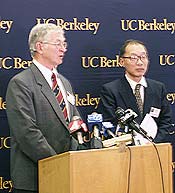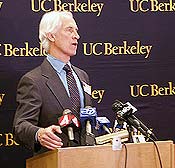North Koreans are open to dialogue, say organizers of UC Berkeley conference
 Robert Bedeski and Yoshinobu Yamamoto, co-chairs of the North Pacific Working Group conference being held at UC Berkeley. (BAP photo) |
"We don't expect diplomatic breakthroughs, but we do expect enhanced communication," said event co-chair Robert Bedeski in a press briefing March 14.
Although the invitation-only conference is the tenth annual meeting of the North Pacific Working Group, this is the first time it has been held in the U.S. The working group is part of the Council for Security Cooperation in the Asia Pacific, chartered in 1993 to offer structured, nongovernmental processes that increase regional confidence building and security. The representatives meet simply as private individuals for what Bedeski described as "a high-powered seminar," not an official summit.
Approximately 30 faculty members and government officials from North Korea, Canada, China, India, Japan, Mongolia, New Zealand, the Philippines, South Korea, the European Union, and the United States are taking part in the two-day conference.
The North Korean delegates — including the country's ambassador to the United Nations and the deputy director and a senior researcher from its Institute for Disarmament and Peace — seemed "more open than we have seen in the past," said Bedeski, a political science professor at the University of Victoria.
Bedeski emphasized that specific issues like North Korea's nuclear reactor program and recent face-off with U.S. military aircraft were not under scrutiny. "There are some general discussions on issues of security and the activities of the United States," he said. "North Koreans essentially want a dialogue between the United States and itself ... they are seeking greater reinforcement or validation that the U.S. will not act aggressively toward them."
Delegates from Japan and the other Asian countries had come with the hopes of initiating an informal multilateral dialogue, said the conference's other co-chair, Yoshinobu Yamamoto, a professor in the department of advanced social and international studies at the University of Tokyo. They wanted "to achieve clarity" on certain issues in order to communicate effective ideas about cooperation to their respective governments.
 T.J. Pempel, director of UC Berkeley's Institute of East Asian Studies and a professor of political science. |
The event's host, T.J. Pempel, director of UC Berkeley's Institute of East Asian Studies and a professor of political science, went further. "Quite clearly the North Koreans are following a multi-track strategy, and on the one hand are waving the sticks that suggest that they will not be pushed around by any others - whether you want to call that paranoia or self-defense is a matter of choice," he said, emphasizing this was only his personal view. "But the flip side is that the North Koreans have every incentive to try and open a dialogue to see where there is room for resolution of the issues. I think in doing that, they're hopeful that coming to the U.S., coming to a meeting that includes representatives of many other governments, will speed resolution of the tension."
The conference has already reduced the recent friction between South Korea and the U.S., Bedeski recounted, through a discussion of the U.S. media's misquoting of a South Korean official.
This time, they could speak "candidly with the understanding that their statements will not go directly to the press," Bedeski said. "It provides governments some release from official positions and allows more freewheeling discussion."
That discussion could have far-reaching effects, suggested Pempel. "The Council and other Track 2 [nongovernmental] processes try to create a broader climate of trust and to create a number of individuals who know each other on a less formal basis - who, in the event of future difficulties, perhaps can get on the phone, shoot one another an e-mail, run up a trial balloon, or whatever might make it possible for a quicker and easier resolution of tensions."

